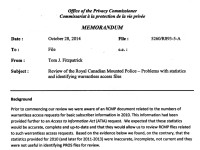The launch of the Canadian copyright notice system earlier this year raised serious concerns as Rightscorp, a U.S.-based anti-piracy company, sent notices that misstated Canadian law and demanded that users pay to settle claims. The misuse of the Canadian system was the result of the government’s failure to establish regulations prohibiting misleading content or the use of notice-and-notice to demand settlements. Despite more than a year of work on potential regulations – including possible costs to rights holders for sending notifications – Industry Minister James Moore abandoned the process, implementing the system with no costs, no limitations on notice content, no restrictions on settlement demands, and no sanctions for the inclusion of false or misleading information. The government’s backgrounder says that the law “sets clear rules on the content of these notices”, however, it does not restrict the ability for rights holders to include information that goes beyond the statutory minimum.
The furor over the Rightscorp notices died down in recent weeks, but now another U.S. anti-piracy firm is flooding the Canadian market with thousands of notices, all seeking payment for alleged infringements. CEG TEK, a well-known U.S. firm, is sending notices that reference Canadian copyright law, but use the notice-and-notice system to pressure recipients into paying large settlements. A blog reader sent along a sample notice posted below (TekSavvy has posted a similar one they received).










